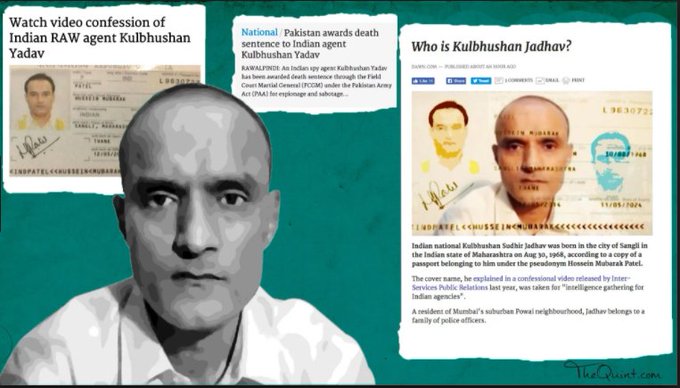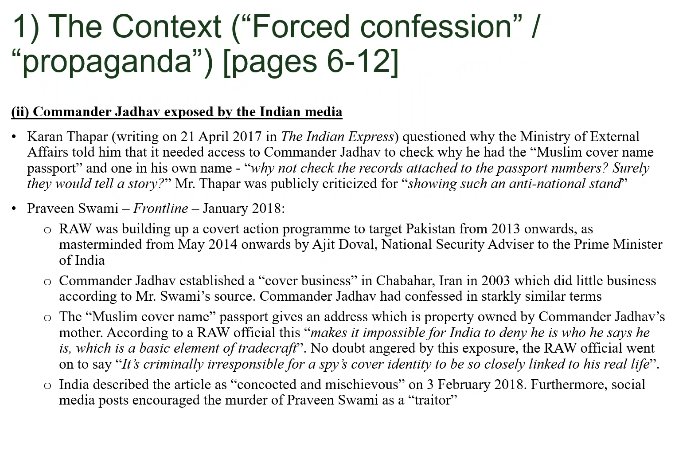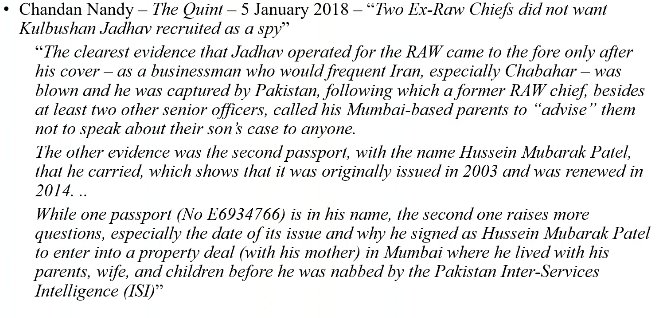INDIAN MEDIA IS HELPING PAKISTAN-ISI TO GET JADHAV HANGED
by IRC-ADMIN - Feb 20 2019 1:00PM

Every time there is an escalation of the situation between India and Pakistan a lot of things come along with it. A show of spirits from the Indians, calling out the hypocrisy and inhuman activities of the Pak government and the ISI has been a usual show of strength shown by India and Indian media. But in all these times, what is even more concerning has been the fact, there is always a group of people breeding in our country that has been fueling our enemy’s cause. Yes, you read that right. Even during the toughest of times in our country, these groups under the garb of journalism and freedom of speech have been peddling lies and perceptions for Pakistan. They have been caught plenty of times supporting the enemy narrative.
At present, India has been going through one of the toughest of crisis after the Pulwama attack. But even before this during the Kulbhushan Yadav case, these so-called journalists have been doing their best to support the enemy narrative. This was even quoted by the Pakistani lawyer in the trial of the Kulbhushan Jadhav case in the International Court of Justice. The Pakistani side had quoted Karan Thapar, the Quint and Praveen Swami as supporting their narrative. Through this article, IRC would like to expose this attitude of some vested interests in the media like this and also look deep into how they have knowingly or unknowingly helping Pakistan in supporting their narrative.
KULBHUSHAN JADHAV CASE - BACKGROUND
Kulbhushan Sudhir Jadhav is an Indian national. It is alleged by the Pakistani government that he was arrested in the Pakistani province of Balochistan on charges of terrorism and spying for India's intelligence agency, the Research and Analysis Wing. On 10 April 2017, Indian foreign ministry said he had been "kidnapped last year from Iran and his subsequent presence in Pakistan has never been explained credibly". The Pakistani government stated that he was a serving commander in the Indian Navy who was involved in subversive activities inside Pakistan and was arrested on 3 March 2016 during a counter-intelligence operation in Balochistan. The Indian government recognized Jadhav as a former naval officer but denied any current links with him and maintained that he took premature retirement and was abducted from Iran. On 10 April 2017, Jadhav was sentenced to death by a Field General Court Martial in Pakistan. On 18 May 2017, the International Court of Justice stayed the execution pending the final judgment on the case.
Jadhav was abducted by Pakistan's forces from the Iran–Pakistan border and Pakistan fabricated his documents and leaked them without realizing there were glaring inconsistencies in the same. the Sunni group Jaish ul-Adl is responsible for the kidnapping of Jadhav from the Iran–Pakistan border. According to Indian officials, Jadhav owned a cargo business in Iran and had been working out of Bandar Abbas and Chabahar ports. "It appears that he strayed into Pakistani waters. But there is also a possibility that he was lured into Pakistan sometime back and fake documents were created on him by the ISI." Some Indian intelligence officials also suspected that Jadhav was abducted from the Iran–Pakistan border by an extremist radical group called Jaishul Adil. Jaishul Adil, designated a terrorist organization by Iran, is linked to Al Qaeda and has been often accused of targeting Iranian border guards. They also pointed to the inconsistencies between the claims made by Balochistan minister Sarfaraz Bugti that Jadhav was picked up from Chaman on the Afghan border, and those made by General Bajwa that he was picked from Saravan .
In April 2016, Islamabad briefed diplomats of various countries regarding Jadhav's arrest and his claimed involvement in terrorist activities. The evidence was also shared with the United States and the United Kingdom. Separately, Pakistan's Interior Minister Nisar Ali Khan held a meeting with the Iranian ambassador.[43] In September, Pakistan prepared a dossier outlining evidence of Indian-sponsored terrorism and provided it to the United Nations Secretary-General. It included Jadhav's details. In December 2016, Sartaj Aziz, who functioned as the then Pakistan's Foreign Minister, told members of the country's senate that there was insufficient evidence presented of Jadhav's alleged espionage. "What the dossier contained on Indian spy Kulbhushan Yadav were mere statements. It did not have any conclusive evidence." and that they were waiting for more details. In January 2019, Vikram Sood who headed R&AW from 2000-2003 stated that Pakistan had no leverage over India on Jadhav. He stated, "No spy worth his salt will be caught with his passport. The charges against him are laughable."
HOW THE PAKISTANI-ISI NARRATIVE IS BEING FUELLED BY INDIAN MEDIA
The International Court of Justice is hearing a plea to release Kulbhushan Jadhav who has been lodged in a Pakistani jail on the charges of spying. Jadhav was awarded death penalty by a Pakistani court in 2017. The hearing started yesterday when India presented its case. Today advocate Khawar Qureshi started submission on behalf of Pakistan, contesting the arguments made by India yesterday. And in a huge surprise, the Pakistani advocate used articles published in Indian media to make its case, to prove that Kulbhushan Jadhav was indeed a spy. The Pakistani side quoted an article written by Journalist Karan Thapar in The Indian Express in 2017, where he had questioned the stand on Ministry of External Affairs in regard to Jadhav. The Pakistani advocate also quoted another article from India media, an article by Chandan Nandy published in The Quint. Nandy had alleged that Jadhav has two passports, one in his own name and another with the name Hussein Mubarak Patel, and this was presented as a proof that he was working for RAW in Pakistan. All these articles were widely quoted by Pakistani media, as proofs that the claims of Pakistan are true. This is not the first time comments published by Indian media was used against India in a court outside the country. During the hearing for Vijay Mallya’s extradition in London, Mallya’s lawyers had extensively used articles published against then CBI Special Director Rakesh Asthana in trying to prove that the case against Mallya was politically motivated. The London court had rejected those arguments and ordered the extradition of Mallya to India.
We at IRC do not accuse these people of being terrorists but there is a certain kind of unwritten rules all including us as a media house must follow while doing journalism. Not to add fuel in the pursuit of our enemies to destroy. Add doubts in the minds of people destabilizing the integrity of the country. Not to base reports on mere rumors and built upon strawman conclusions. We here at IRC have always put the nation’s interest first. Some of the senior journalists of this sort trying to create a global image by damaging their own country’s image is the best example of what a media house should never do. People have started realizing them and have started differentiating between black and blue. No media house in the world except those in India have tried to propagate the enemy narrative and by endangering the life of a fellow citizen. If India loses the case (hopefully not), these media houses would have the blood of Indian ex-servicemen in their hands!!!





No comments:
Post a Comment